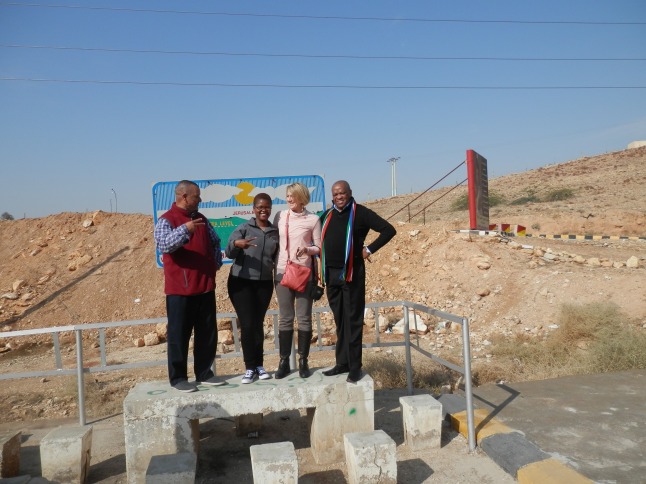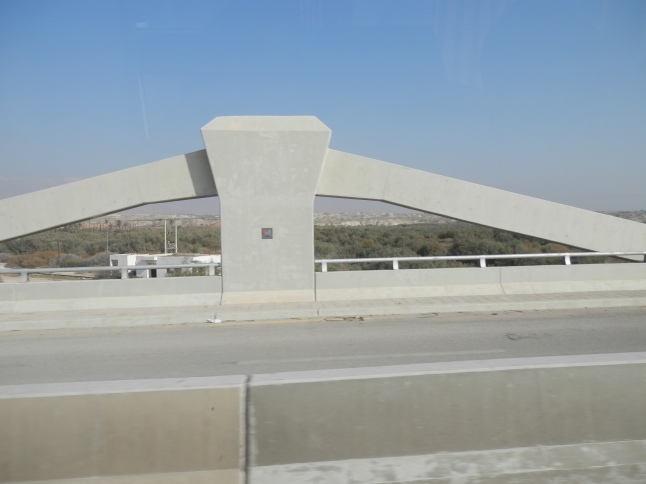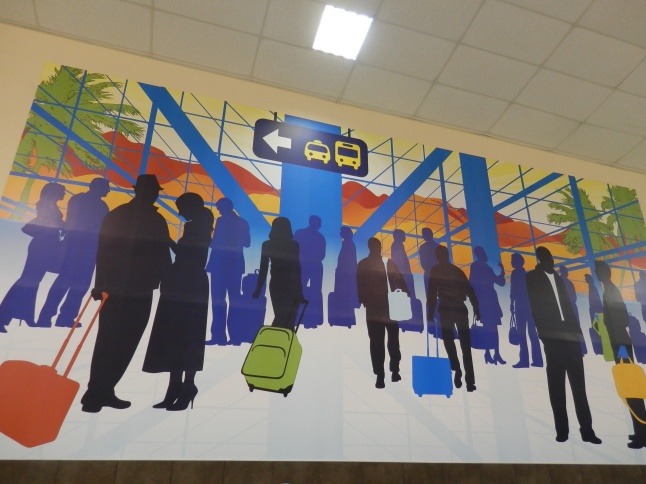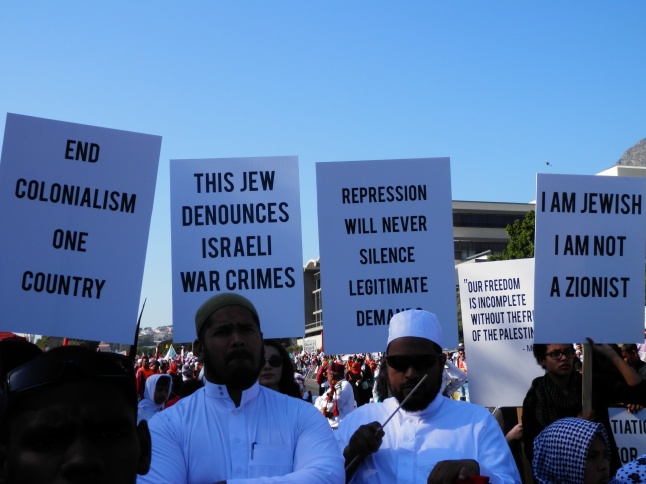On 1 December 2014 the South African Ambassador to Jordan accompanied me and two colleagues as we travelled to the border between Jordan and Israel-Palestine. We were on our way to the Kairos Palestine conference in Bethlehem.


All went fine on the Jordanian side. As we crossed the Allenby Bridge and entered the Israeli controlled border post, I remembered images of a murdered judge at this very same border crossing:

On 10 March 2014 Raed Zuayter, a distinguished judge and PhD holder, was killed by Israeli soldiers while crossing in a similar bus to the one I was sitting in. Zuayter was a Jordanian citizen of Palestinian origin. He was unarmed and a-political. His family is part of the Palestinian diaspora—refugees who had fled ethnic cleansing in 1948, war in 1967, and the Israeli invasion of Lebanon in 1982. “How is his family and especially his wife coping?” I wondered. Judge Zuayter had travelled across the border to collect rental money to cover the medical expenses of their sick child. He never returned home and the child passed away in the same week. (Click here for more information.)

You may find the style of this blog post to be mechanistic, staccato and distanced. I am sorry about it, but right now, I struggle to phrase the unfolding events differently.
At the Israeli border post we had to put our luggage onto a conveyor belt that led into the building. Those of us from Africa had to remain outside to undergo Ebola virus screenings. After waiting for approximately half an hour an official told us to stand on the central ridge of the road. It felt odd: a number of people standing in the sun for a number of minutes before being summoned back. We returned to our seats and were called one by one. A doctor took our temperatures. Those who were declared healthy could enter the building.
At the counter on the inside I was asked where I was heading to, why I wanted to go there, and so forth. Behind the glass screen the lady pointed to something on her computer screen whereupon her colleague said “She should be screened.”
After waiting for about an hour I was taken to a room. They locked the door and asked me to unpack my handbag and my daypack with my tablet and a few personal items. A female soldier did a body search on me. I was told to keep my purse, to hand over my phone, and to leave everything else in the room. A man guided me to another room.
The fairly polite man made lots of notes on a computer while a young woman with an incredibly smooth, beautiful cappuccino-coloured skin questioned me. She kept her hands in the pockets of her jacket as if she was cold. It was winter, but I could not feel any cold. “Why are they not googling me?” I thought. Before leaving South Africa I closed my social media accounts, but I could of course not shut down the internet. They asked lots of things such as why I visited Israel for a third time, what I did on my previous visits, who I know in Israel, and what I had in my luggage. There were many questions, but I think I’m blocking some of them out of my memory.
The man called another young woman. She ignored me and they spoke in Hebrew. She left. The questions continued. They wanted to know what I do for a living. I told them I am a researcher and I spoke about the essay on policy making processes in South Africa that I finished days before my departure. They did not know that South Africans still struggle to build a better life for all. The questions continued. I felt calm knowing very well that they were constructing a profile of me on their system.
The second woman re-entered. Her tone was markedly different. She was visibly angry and irritated. It is perhaps correct to say that she was hateful. She fired groups of questions at me. When was the last time I saw so-and-so (random names on my phone)? Why do I have only stamps of Ethiopia and Namibia in my passport besides those of Israel? Where was my old passport? Why didn’t I have it with me? Whenever I answered, she interrupted me or sneered at what I had said. It was clear that she had done an internet search whilst the other two had recorded my personal details. Still, she wasn’t sure exactly where I fit in. She knew about NC4P (South Africa’s National Coalition for Palestine) and the Cape Town March for Gaza. They were also very aware of BDS (the international boycott, divestment and sanctions campaign), but said nothing about our local boycott of Woolworths.
She wanted to know exactly what roles I play. I told her that besides being a member of Kairos Southern Africa and a researcher at Stellenbosch University, I hold no other positions. She was doing her best to intimidate and unnerve me. I remained calm and polite. She was so very desperate to find an enemy in me and I refused it. All of this went on for about four or five hours. I don’t remember how it ended or at which point they gave up on me. However I do remember asking if having my profile on their system meant that I cannot enter Israel now or in future. The man said it is not up to them to say, they are just doing their job. He offered me something to drink and I asked for tea.
With my phone, but without my passport, they took me to a narrow corridor with a row of chairs. After a while someone brought me about 100ml of weak tea in a white plastic cup. A Palestinian woman with two young people – perhaps her children – sat waiting on the chairs. When the woman asked me if I was cold I realised that my legs were shivering uncontrollably. Even with effort I could not still them. I was still not feeling any cold.
The woman was summoned inside. A man shouted loudly at her and the young woman stood listening on our side of the locked door. The woman came out, went back in, came out, went back in, waited once more and after a while the three of them were taken away. They received no tea. I don’t know where they were taken to.
All the while soldiers entered the doors to the left and to the right of the corridor. They slammed the doors loudly. We seemed to have been reduced to invisible particles of dust.
More time passed.
I sent a text message to the South African Ambassador in Jordan to say that I might need his help in fetching me and/or my colleagues later that night. At that stage my biggest worry was about them. Where were they? What happened to them? We agreed beforehand to refrain from texting one another in case one or more of us were interrogated.
At around 22:00 yet another woman instructed me to fetch my handbag and backpack, to follow her out of the corridor and to sit in the hall. The welcoming image on the wall was to say the very least, totally out of place and deceiving – there was nothing normal, free or colourful about the situation:

I went through my hand luggage. My tablet was switched on and my book mark was missing.
I now started to remember my two pieces of luggage that entered the building on the conveyor belt when the sun was still shining. They were nowhere to be seen on the moving belt. By now I was indeed shivering from cold. I asked an official how and when I could try to find my bags and she opened a side gate and accompanied me to the other side of the hall. Finding both pieces and being able to put the luggage on a trolley that I could push gave me a sudden sense of belonging. I had stuff. I had a life, a history, a place, a face.
During the course of the eleven hours they detained me, I passed through the hands of fourteen or more people. All seemed to just do their job without anyone accepting responsibility for the person or the situation. A Palestinian friend who is well acquainted with the process of interrogation later described it in an email to me as “a sea of uncertainty, temporality, emergency and hopelessness.”
I texted my colleague Rev Edwin Arrison in South Africa. He told me that my two colleagues went through after seven hours of interrogation. Two more sets of people came to ask questions. I was relieved to hear that my visa was about to be issued. I waited.
Then a young man summoned me abruptly to follow him. As I stood up to follow him I realised that he was walking in the wrong direction. With a voice like the bark of a dog and without eye contact he said I was not allowed to enter Israel, but must wait outside the building. And there I was, a middle-aged woman with no sharp objects or explosives in her luggage (they searched my other bags too) under the guard of five armed soldiers, waiting outside in the winter’s night for the shuttle to return to the Jordan border post.
It felt as if everything happened in an abrupt, disjointed way. Perhaps similar to the way I am telling the story. But actually it was a carefully orchestrated process, designed to humiliate, to provoke, to intimidate and to punish. Why not refuse me from the start and let me go? They seemed so desperate to find an enemy in me. Yet I refuse to allow the behaviour of others to dictate my own.
I do not hate anyone. I am convinced that not all Jewish Israelis are bad people even though so many of them do bad things to other people. I hate and oppose systems of privileging one group of people over another, but I do not hate Zionist Jews. I see the desperation of Zionists to cling to the idea of a small, threatened people in a sea of hate when Israel is in fact a military superpower that routinely violates international laws. Their minds and lives are held captive by their own perspectives.
It was cold outside the building. I asked to use the bathroom. A porter with an Arabic accent, someone who is no longer young (perhaps an Arab Palestinian Israeli?) rushed to my side from nowhere. He insisted on taking my trolley as a gesture of help and directed me to an opening in the wall of the building near the conveyor belt. He rushed to part the plastic panels so that I could walk through it, he helped me pass the security gate, and he watched over my things when I was in the restroom. On my return he helped once more in a gentle manner. He made me feel as if I was the most honoured person to have ever visited that border post.
When the bus eventually departed, I was the only passenger. Dr Molefe Tsele, South African Ambassador to Jordan, and one of his colleagues, met me around 01:00 on the Jordan side. He brought me a flask of hot tea and some biscuits.
By that time my passport carried two red stamps, but it was back in my handbag. I am still South African. I am free.
 Ambassador Dr. Tsele Molefe and his wife graciously and generously hosted me for two days in Amman. I am infinitely grateful to them for their wisdom, their warmth and their practical help.
Ambassador Dr. Tsele Molefe and his wife graciously and generously hosted me for two days in Amman. I am infinitely grateful to them for their wisdom, their warmth and their practical help.


If you have read up to here, you probably realise that this post is a raw account. When I’m ready I shall try to reflect on the experience more coherently and perhaps also share some details of my simply wonderful encounter with family members of the murdered Judge Zuayter on my second day in Amman.
Finally – here is a short video recording made at Cape Town International Airport on my arrival – click here to listen to it.
* Allenby Bridge is called King Husain Bridge by the Jordanians.





































































